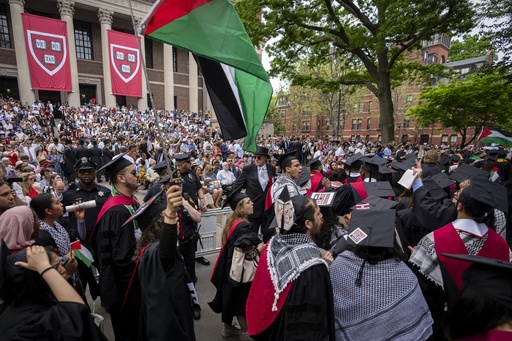CAMBRIDGE, Mass. — A fresh surge of pro-Palestinian demonstrations has erupted at Harvard University, marked by “study-in” actions from both students and faculty members at campus libraries. These protests are part of a broader movement that has seen similar activities taking place on college campuses across the nation, increasingly attracting the involvement of faculty.
Approximately twenty faculty members participated in an Oct. 16 “study-in” to express solidarity with students who were temporarily barred from library access for a prior protest. These faculty participants were subsequently issued two-week suspensions from library privileges, as reported by the student publication The Harvard Crimson.
In this form of protest, participants read relevant materials quietly while displaying signs about dissent and university policies alongside their tables or on the backs of their laptops. The pro-Palestinian sentiments have stirred significant debate and division within Harvard and on various campuses throughout the year.
Kerry Conley, the communications director for Harvard Library, opted not to comment on individual cases concerning library access and privileges. Faculty members were informed that their ability to borrow items from the library would not be affected, although they were prohibited from entering Widener, the university’s main library.
According to the Crimson, library officials asserted that the faculty’s gathering constituted a deliberate effort to attract attention through tent-card signs, a violation of library policies. Additionally, the group known as Harvard Out of Occupied Palestine stated that more than 60 Harvard Law School students faced library suspensions due to their involvement in a related study-in.
In reaction to these suspensions, over 50 students, faculty, and staff members participated in another study-in on Thursday to voice opposition to what they labeled as Harvard’s “complicity in Israel’s genocide in Palestine and campus repression.” This protest marked the fourth study-in of the semester.
During the previous week’s demonstration, many students donned keffiyeh scarves and quietly engaged in their studies in the library’s reading room. Their laptops bore messages like “FREE PALESTINE” and “HARVARD DIVEST FROM DEATH,” according to accounts from the protest organizers. Dr. Karameh Kuemmerle, a faculty member at Harvard Medical School, was also among the protestors.
“What was intended to be a peaceful hour dedicated to studying significant texts alongside colleagues, and an unobtrusive act of solidarity against the genocide of my people, has been disingenuously portrayed as a childish ploy for attention,” expressed Kuemmerle in a statement from protest organizers. “Remaining silent in the face of genocide in Palestine contributes to its perpetuation. Harvard has chosen to silence us.”
University Librarian Martha Whitehead articulated in an essay the library’s foundational commitment to protecting the rights of all community members. “When individuals gather to display signs, a reading room is transformed from a space for solitary learning and contemplation into a venue for public expressions,” she stated. Whitehead emphasized that if library spaces become platforms for protests—regardless of their nature or message—they risk losing their essential function as centers for research and education.


